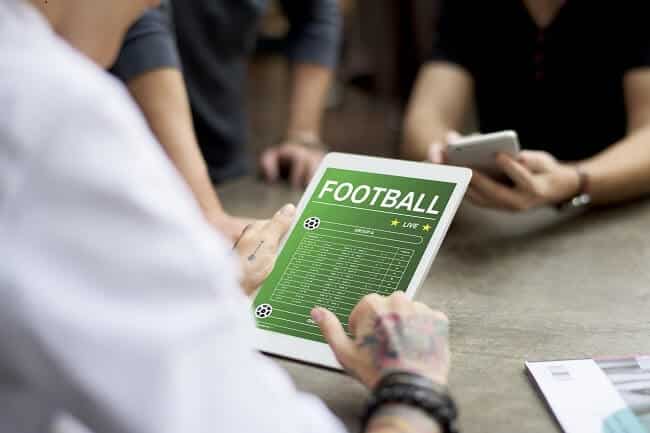Sports betting odds are basically the laying bricks of the paradigm in betting terms. Without odds, everything else is meaningless because you can’t make anything out of anything.
What Are Betting Odds?
For the most part, odds imply probability. It refers to the likelihood of an event. It can go both ways as to whether the event is likely to happen or not.
For example, if we say the odds of getting into an accident during rain is high, it means you should drive carefully when it’s raining. How did we know it? From previous statistics by the Ministry of Transport in Ghana, of course.
Similarly, sportsbooks can analyse previous statistics, team formation, player form, injury, and lots of other factors. The end result is how likely it is for the team to win the match. The same goes for individual players and the associated markets.
In sports betting, however, odds have another role to play. They can project how much you will win from a bet. For casino games, you usually don’t know how much you can win as the odds vary from round to round. But with sports, you can place informed bets knowing the final outcome.
In different countries, odds have different forms. They might look different but they all refer to the same thing—the likelihood of the event and your winning potential. Throughout our guide, we’re going to look at the different types of odds, how they are calculated, and examples to understand them better.

What are Fractional Odds?
This type of odds is very commonly used in the UK and Ireland. You can always use them in Ghana if you want because most modern sportsbooks have the option to change the format. Fractional odds are simply the ratio of your projected profit and stake.
It’s called “fractional” because it’s denoted as a fraction. Or, ratio, as we already said. The job of fractional betting odds is the same as any other odds format. To tell you the value of your bet as well as how likely the event is.
How Do You Calculate Fractional Odds?
Calculating fractional betting odds is as simple as looking at it and doing some minor additions. The odds are written in this format – “Profit/Stake”.
So, if a football team has 5/2 odds in Ghana, it means you will win 5 GHS if you bet 2 GHS. Now, the ratio is made with integer numbers for better understanding. If you want to think of this as 2.5/1, it means the same thing. But introducing a decimal component only adds to the complexity of the paradigm.
Fractional Odds Example
Let’s take a look at an example for fractional odds to understand exactly what it means. As our test subject, let’s take a football match between Ghana and Nigeria on Ghana’s home ground.
If you visit an online sportsbook and look at the betting odds, you’ll find 2 different projections, 1 for each team. For the sake of simplicity, we’re considering the match winner market. But the concept remains the same for all other markets as well.
Let’s assume the odds go like Ghana 5/2 vs Nigeria 7/2. Again, this is just an example and you may never find such odds for a real-life match.
You already had the betting odds explained previously. As it seems, you can win 5 GHS if Ghana wins the match and 7 GHS if Nigeria wins the match.
Between the 2, Ghana is the favourite and is more likely to win. How do we know it? Because you can win more for the same wager if Nigeria wins. The bookmaker has “pegged” Ghana as the favourite and most punters think it’s the likely team to win. So, the involved risks are lower for this team. Hence, the projected win is lower.
What Are Decimal Odds?
Decimal is by far the most commonly used odds format all over the world. Most European countries, Canada, Australia, New Zealand, Nigeria, etc. countries use the decimal format for their sports betting needs. Ghanaians, too, are most comfortable with using the decimal odds.
It’s called the “decimal” odds because it’s denoted as a number with 2 decimal positions. It’s also known as European odds as it’s the most popular in European countries.
In retrospect, understanding the decimal sports betting odds are simpler when compared to fractional odds. It’s a direct multiplier for your stake. So, whatever the projected odds are, you just multiply it with your stake to calculate the final payout.
How Do You Calculate Decimal Odds?
As we already said, it’s a direct multiplier for your stake. But the important distinction here is that the value you get after multiplying is your total winning and not the profit. To calculate the profit, you must deduct the stake amount from the payout amount.
Just like all the other odds, decimal odds give you the probability of the event. In association with implied probability, 2.00 odds mean there’s a 50-50 chance the team will win. Under 2.00 odds mean the team is more likely to win. And the opposite is true when the odds are over 2.00.
Decimal Odds Example
To keep things streamlined, let’s use the same example as before. The football match between Ghana and Nigeria. Keeping the circumstance the same, Ghana is the favourite and Nigeria is the underdog.
We can say it because we already know it from the previous example. But what if there were no examples? How would you know who is the favourite and who is the underdog?
It’s as simple as looking at the odds.
Let’s say the odds at a reputed Ghanaian bookmaker is Ghana 1.60 vs Nigeria 2.40. As the odds for Ghana are shorter than 2.00, it means Ghana has more than 50% probability to win. Hence, it’s the favourite. The opposite is true for Nigeria.
Now, if you decide to wager 100 GHS on Ghana for the match and it wins, you’ll take home a decent 160 GHS home. Here, 100 GHS is your wager or investment and the 60 GHS is your profit.
For Nigeria, on the other hand, you can win a massive 240 GHS for the same wager. It’s because the odds are longer and you’re going against the probability. Hence, the rewards are larger. In the 240 GHS payout, 100 GHS is your wagering and a whopping 140 GHS is your profit.
However, we don’t condone betting on the underdog all the time. It takes a certain level of experience in the industry to interpret the betting odds accurately. You also need to analyse a lot of variables before you can actually gather the insights to know that the underdog will win.

Percentage Odds
Well, the percentage odds are something you won’t find very often in Ghana. In fact, it’s one of the lesser-known formats all over the world. As the name suggests, it’s a percentage the online bookmaker gives you. Technically, that’s simply the implied probability of the event.
So, even though you’re not getting the direct projection of your payout, you can always convert it to any of the known sports betting odds formats.
How Do You Calculate Percentage Odds?
You don’t. You convert it to another format. Percentage odds are basically implied probability and it has an intimate connection with the known odds format. They’re all interchangeable. There are plenty of calculators online that you can use to convert the percentage odds to decimal or fractional betting odds explained.
Percentage Odds Example
If an online bookmaker in Ghana is using this format, it’s basically giving you the probability. A 50% probability is 2.00 in Decimal and 1/1 in fractional. Now, you can craft it as you want according to your bet size.

American Odds
American odds, also known as Moneyline odds, are often considered very complex. That’s because it is. It’s not as straightforward as the rest of the betting odds we’ve explored so far. It uses a 3-digit number with a plus (+) and minus (-) to distinguish between the favourite and the underdog.
The team with the (+) in the odds is the underdog and the team with the (-) in the odds is the favourite. Interestingly, when the implied probability is under 50%, it’s (+) and when it’s over 50%, it’s (-).
How Do You Calculate American Odds?
The most important thing to keep in mind is that everything is calculated with the base value of 100 in mind. For Americans, it’s $100. You can think of it as 100 GHS in a Ghanaian context.
The number with (+) indicates how much you will win for a 100 GHS bet. And the number with the (-) indicates how much you have to wager to win a 100 GHS profit. If you can wrap your mind around this paragraph, understanding the rest is a walk in the park.
American Odds Example
Let’s go with the same football match between Ghana and Nigeria. But this time with American odds.
The projected odds, in this case, is Ghana (-150) vs Nigeria (+250).
What it basically means is that if you want to bet in favour of Ghana, you need to wager 150 GHS for a 100 GSH profit. Now, if you want to profit 200 GHS, you’ll need to wager 300 GHS.
On the other hand, if you bet on Nigeria, you will win a whopping 250 GHS for a 100 GHS bet. As it’s the underdog, the payout is considerably larger.
How Are Betting Odds Calculated
We’ve already covered all the major odds formats and taught you how to calculate the winnings from them. To help you out even further, here’s an odds calculator that you can use to seamlessly navigate between the sports betting odds.
Betting Odds FAQ
Odds are a fundamental part of the sports betting industry. It shows us how likely the event is we’re targeting and how much we can win if we decide to bet on it.
As you already have the betting odds explained, reading any type of format becomes a child’s play. In our guide today, we’ve covered how to read all of them.
Although different, odds and probability are intertwined. Probability is the likelihood of an event. Odds, on the other hand, is the ratio between the probability of the event happening and not happening.
Probability always ranges between 0 and 1. You can calculate probability from odds using our calculator. Now, if you deduct the probability in favour from 1, you’ll get the probability against. From there, you can calculate the odds against.
Rather than the sport, it depends on what market you’re talking about. Odds for most markets are calculated following the formula we shared in this guide. Handicap and points spread are calculated a little differently.



